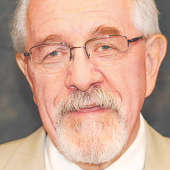- Christmas shopping is done, presents wrapped, strings attached? (12/14/16)
- Cecil is dead and human lives are threatened every day (8/12/15)
- As state flags go, Nebraska's ranks 50th (7/8/15)
- When everything looks like a nail (4/29/15)
- Who remembers to coal slurry pipeline debate? (3/11/15)
- More revelations in Department of Corrections mess (12/17/14)
- The Legislature becomes more Republican (11/19/14)
Opinion
The First Amendment and Nebraska's campaign finance law
Wednesday, August 24, 2011
LINCOLN -- The U.S. Supreme Court says that sometimes the candidate who has less money and qualifies for public campaign financing can be a threat to the First Amendment rights of the candidate who may have lots of money to spend.
That decision by a 5-4 majority puts a portion of Nebraska's law for public financing in jeopardy, according to Attorney General Jon Bruning.
The view from here: Even a lay person (like a statehouse correspondent) can read the June decision, which threw out an Arizona public finance law, and easily understand how the Nebraska law might be on the losing end of a court challenge. And even a cursory reading of Bruning's opinion makes clear how he easily arrived at his decision.
The Arizona law provides public dollars for candidates who agree to abide by its provisions, intended to curb potential corruption. The law provides money to match the spending of candidates who choose not to abide by the law's provisions.
The Supreme Court majority figured it this way:
The candidates funding their own campaigns might effectively have their right to free speech violated because ... they might be afraid if they spend more money to get their message out, they would have to worry about more public financing going to their opponents, thus indirectly helping the opponent getting out his or her message.
The dissenters said Arizona's compelling interest in seeking to hold down corruption should outweigh the majority's perception of a free speech issue.
The Nebraska law is based, in part, on providing public funds for candidates who agree to abide by established spending limits after their opponents exceed certain spending levels.
The state's Accountability and Disclosure Commission, which oversees the state's campaign finance laws, planned to review the Supreme Court's decision and Bruning's assessment before the end of August.
Wishing the governors luck
The governors of a bunch of "Missouri River states" hope to come up with some mutually agreeable notions as to how the Army Corps of Engineers should handle the river's flows. They met recently in Omaha at the invitation of Gov. Dave Heineman.
South Dakota has sport fishing interests. So do some other states. And there are agricultural concerns, and the barge trade is desperate to make sure of sufficient flows to allow them to do business.
After this year's devastating floods, there seems to be a consensus that perhaps the Corps' top priority in the future should be flood control -- first and foremost.
How much weight a recommendation from a majority of the governors might have can't be guesstimated at this stage. But it can be guesstimated that there won't be unanimity among the states' chief executives.
Government officials from Congress to city halls want to know what can be done to avoid a reoccurrence of the flooding that topped levies, flooded communities and farmland and wreaked havoc with transportation in some areas as waters poured over roadways.
It's hard to imagine the issue being settled by anything other than a test of power and wills in Congress, where the representatives with the most power can work their will.

